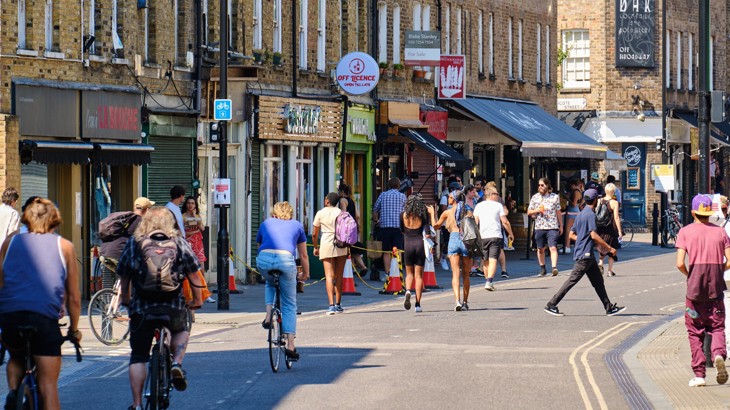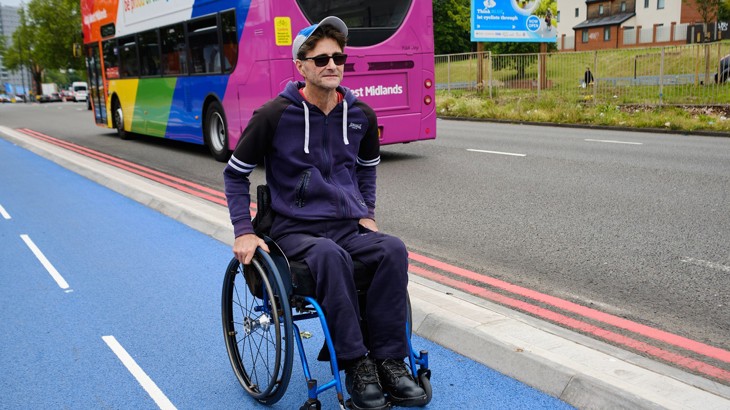The Covid-19 pandemic is a wake-up call. The way we currently live is neither sustainable nor fair. In the third of our Life after lockdown series, we share our solutions for a green and just recovery.
Life after lockdown is a series of Sustrans briefing papers exploring ideas and solutions to help us build back better, creating healthier places and happier people.

© Jon Bewley
Download the Green and Just Recovery: healthier places and better transport policy briefing.
This summary is also available to download.
The Covid-19 pandemic is a wake-up call. The way we currently live is neither sustainable nor fair.
The climate crisis and destruction of the natural world is entwined with the rise in global pandemics.
Our economy is not working for many people, and more people are spending more time living in poor health.
Covid-19 and many other crises are now inevitable, they’re not going away. The choice facing the UK is not whether we change, but when.
Healthier places and better transport will underpin the UK’s recovery.
How people access their everyday needs and move around our cities, towns and neighbourhoods will play a vital role in helping the nation’s future economic recovery and progress towards a greener and fairer society.
We are currently facing: inequity, the climate crisis, air pollution, physical inactivity, community severance, road collisions, congestion, high street crisis and economic stagnation.
Bold ideas for healthier places and better transport
Record investment exists in transport, and targets to build new homes are higher than ever before.
A radical transformation in transport and planning policy is required to:
- Prioritise the most vulnerable, and reduce societal and health inequities
- Become net-zero, improve air quality and the natural environment
- Improve economic resilience and wellbeing for all people.

© Jon Bewley
Solution 1: A plan for heathier places and living locally, designed around 20-minute neighbourhoods
The global Covid-19 pandemic has generated new habits to live more locally.
Living in proximity to everyday needs and services can help increase access and reduce inequalities whilst reducing the need to travel longer distances.
We need to:
- Adopt a 20-minute neighbourhood planning principle to ensure everyone has a choice to live within walking distance of everyday needs and amenities
- Invest in and incentivise 20-minute neighbourhood planning for new developments and urban regeneration
- Introduce a levy on online shopping, and invest in local high streets to create welcoming and safe neighbourhood centres with more space for people.
Solution 2: A green and just revolution in transport demand and investment
Planned investment in transport in the UK does not align with our targets for decarbonisation, reducing inequity, and likely changes to travel demand following Covid-19.
Transport is the biggest emitter of greenhouse gas (GHG) emissions in the UK.
Electric vehicles have a role, but modelling suggests private vehicle use will need to be reduced by up to 60% by 2030 to meet climate change targets.
We need to:
- Introduce annual targets to reduce travel demand from private motor vehicles
- Review existing funding commitments for transport infrastructure that will increase GHG emissions
- Increase funding for walking and cycling with a minimum of £8bn over the next five years and ensure funding prioritises reducing inequity
- Improve public transport operating models and increase investment in public transport
- Electrify motor transport so that all new cars are electric by 2030 and provide financial support for poorer households who are dependent on-road travel.
Solution 3: Ensure fiscal incentives favour public transport, walking and cycling
Green stimulus measures alone are unlikely to be enough. Journeys by sustainable modes need to be more attractive to people and businesses than driving to change behaviours.
Driving in the UK is currently subsidised. The costs to people’s health and the environment are borne elsewhere and by others who do not drive, or drive far less.
We need to:
- Introduce road pricing and increase fuel duty, fairly
- Introduce a frequent flyer levy and use this to make travel by trains, buses and ferries cheaper, greener and more attractive
- Make public transport affordable or free.
Solution 4: A ‘Green New Deal’ for jobs and skills
Economic forecasts suggest the UK economy will shrink between 8% and 14% this year. Redundancies are being announced on a daily basis and youth unemployment could rise to two million.
The opportunities to create low-carbon jobs and industries across all sectors have never been greater.
Cycling and walking infrastructure are one of the best investments the UK government could make, with the potential to create 103,000 jobs in the next two years.
We need to:
- Develop a green jobs programme that creates thousands of new low-carbon jobs
- Protect and reskill existing workers across the transport sector, whilst creating new jobs for low-carbon roles
- Increase workforce diversity across the sector.





